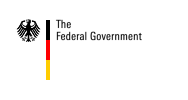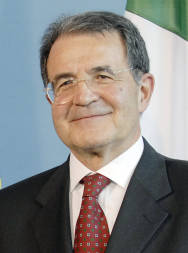Two are their nieces: Chiara and Benedetta. After receiving the high school's diploma in classical studies at the Liceo Ludovico Ariosto of Reggio Emilia, Italy, Romano Prodi studied law at the University Cattolica of Milan, and in 1961 he graduated cum laude presenting to professor Siro Lombardini a final dissertation on protectionism in Italy's industrial sector.
He did his postgraduate studies at the universities of Milan and Bologna and at the London School of Economics, under the supervision of professor Basil Yamev, chairman Industrial Economics's. Romano Prodi has also been visiting professor at Harvard University and at Stanford Research Institute. President Prodi's academic career began at the department of Political Sciences at the University of Bologna, where he worked as an assistant (1963), associated lecturer (1966) and finally as lecturer in Industrial Organisation and Industrial Policy (1971-1999). Beside the teaching, he pursued an intense research activity directed, in the early phase, towards two of the most classical studies in Industrial Economics: development of small and medium size companies and of industrial districts (A Development's Model in a Rapid Growth's Sector: Ceramic's Industry in the Building's Sector, published in 1966, is one of the first essays on the argument), and antitrust policy (Dynamic Competition and Market Power, published in 1967).
His name often appears in international literature next to Giacomo Becattini, Franco Momigliano and Paolo Sylos Labini, founder of the "Italian School of Industrial Economics". Later his research focused on the relations between the Market and the State; privatisation's policies; educational systems and their central role in promoting economic development and social cohesion; the process of European integration, and after the fall of the Berlin's wall, dynamics of the different "models of capitalism". From 1974 until 1978 he chaired an editing society, the "Società Editrice Il Mulino". In 1981 he founded "Nomisma", one of the major Italian companies of economic studies, and since 1995 he chaired its Scientific Committee.
Prodi wrote editorials for the major Italian newspapers, as Il Corriere della Sera and Il Sole 24 Ore. He was director of Industria- Rivista di economia e politica industriale for many years. In 1992 he presented for Raiuno the television program "Il tempo delle scelte", a six economics' lectures series.
From November 1978 until March 1979 Romano Prodi has been Italy's Minister of Industry.
From November 1982 until October 1989 he has been president of the Institute of Industrial Reconstruction (Istituto per la Ricostruzione Industriale, IRI), the major Italian holding at that time. Under Prodi's presidency, the Institute underwent a phase of deep restructuring that paved the way for a process of transformation and companies' privatisation.
In May 1993 Romano Prodi was back in office at IRI and he brought forward the privatisation of important companies, such as Credito Italiano and Banca Commerciale Italiana.
In February 1995 Romano Prodi founded the "Ulivo" political centre-left coalition, which designed him as candidate for Italy's Presidency of the Council of Ministers. Political elections were held in April 1996, and the "Ulivo" prevailed over the centre-right coalition: consequently, in May 1996, the President of the Republic instructed Prodi to form the new government.
Once the Parliament voted for its approval, Prodi's Government stayed in charge until October 1998 succeeding - among other things - to successfully bring Italy into the euro-zone.
In March 1999, the European Council chose Romano Prodi as President of the European Commission, based in Brussels, and the European Parliament confirmed this choice in September 1999.
During the five years of Prodi's presidency the European Commission played a central role in bringing forth some of the European Union's historical processes such as the adoption of the euro as the EU's common currency and the enlargement to a European Union of 25 Member States, together with an effective and intense Neighbourhood's Policy.
In 2005 Romano Prodi became president of the "Unione", Italy's centre-left parties' coalition. After winning the primaries elections of October 2005, which gave him the political leadership of the "Unione", he became "Ulivo" 's main candidate for the political elections of 9 and 10 April 2006. He has been elected Member of the Chamber of Deputies of the XV Italian legislation.
On May the 17th the President of the Republic Giorgio Napolitano instructed him to form the new government, and since then Romano Prodi is Prime Minister of the 59th Government of the Italian Republic. Along his academic and institutional career Romano Prodi received many awards. Among others, he has been awarded the nomination honoris causa as member of the London School of Economics and Political Sciences (1989) and the nomination honoris causa as member of the Real Academia de Ciencias Morales y Politicas of Madrid, Spain (1997).
In May 1999 he obtained the Schumpeter Award of the Schumpeter Society of Vien, Austria.
He also received many academic awards honoris causa, such as the ones awarded to him by the University of Madras, India (January 1998);
- University of Sofia, Bulgaria (February 1998);
- Universitat Politecnica of Barcelona, Spain (December 1998);
- Brown University at Providence, Rhode Island, United States of America (May 1999);´
- University of Michigan, Ann Arbor, Michigan, United States of America (December 1999);
- Academy of Economics' Studies, Bucarest, Romania (January 2000);
- Catholic University of Louvain, Louvain-la-Neuve, Belgium (February 2000);
- University of Malta (March 2000);
- University of Modena- Reggio Emilia, Italy,
- University of Ottawa, Canada,
- University of St. Gallen, Switzerland (Freedom Prize, 2000);
- University Kyung Hee, Seul, South Corea (October 2000);
- University of Pisa, Italy (October, 2001);
- University of Tirana, Albania (November 2001);
- Instituto de Empresa of Madrid, Spain (MBA Diploma, February 2002);
- University of Oxford, United Kingdom (April 2002);
- University of Pavia, Italy (Gold Metal for Ecomics, 2002);
- University of Skopje, Former Yugoslav Republic of Macedonia (February, 2003);
- University of Tunisi, Tunisia (P.h.D. honoris causa, March 2003);
- University of Calabria, Italy (October 2003);
- University of Turin, Italy (September 2004);
- University of Lublin, Poland (October 2004).

